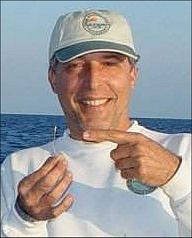 |
 Charles
Messing, Professor of Oceanography, has been affiliated with Nova Southeastern
University for 18 years and has been part of the South Florida marine biological
community since 1970 when he began graduate work at the University of Miami's
Rosenstiel School of Marine and Atmospheric Science. There, he accompanied
several deep-sea dredging and coral reef research expeditions around the
Caribbean and Eastern Pacific, and completed both M.S. (1975; on crinoid
systematics) and Ph.D. (1979; on crustacean development and ecology) degrees.
This was followed by a Smithsonian post-doctoral research fellowship to continue
work on crinoid systematics and a brief lectureship with the University of
Miami’s Undergraduate Marine Science Program. His subsequent field research on
crinoid ecology, biogeography and systematics has taken him to the Bahamas,
Papua New Guinea, the Philippines, Micronesia, Australia and Malaysia. He has
received three National Science Foundation grants to use the Johnson Sea-Link
submersibles to study the ecology, growth, distribution and taphonomy of
stalked crinoids in the Bahamas, using these animals as actualistic models for
better understanding fossil crinoids. As a result, he was the first to measure
the growth of stalked sea lilies in situ. More recently, he has become
involved in investigating the ecology of deep-water azooxanthellate coral reefs
dominated by Lophelia pertusa off eastern Florida. Because the
taxonomy of extant crinoids remains in substantial disarray, particularly at
generic and specific levels, he has spent a substantial amount of time on museum
work, disentangling numerous taxonomic problems, particularly among unstalked
(comatulid) crinoids. He is the author or co-author of over 40 scientific
articles, chiefly on crinoids, but has also studied the effects of dredging and
beach renourishment on marine habitats in Broward County, FL, and the ecology of
deep-water non-hydrothermal hardbottoms. In addition to his research, he is a
scientific illustrator and teaches a variety of undergraduate and graduate
courses at NSU, including biology, invertebrate zoology and the taxonomy of
marine invertebrates. Charles
Messing, Professor of Oceanography, has been affiliated with Nova Southeastern
University for 18 years and has been part of the South Florida marine biological
community since 1970 when he began graduate work at the University of Miami's
Rosenstiel School of Marine and Atmospheric Science. There, he accompanied
several deep-sea dredging and coral reef research expeditions around the
Caribbean and Eastern Pacific, and completed both M.S. (1975; on crinoid
systematics) and Ph.D. (1979; on crustacean development and ecology) degrees.
This was followed by a Smithsonian post-doctoral research fellowship to continue
work on crinoid systematics and a brief lectureship with the University of
Miami’s Undergraduate Marine Science Program. His subsequent field research on
crinoid ecology, biogeography and systematics has taken him to the Bahamas,
Papua New Guinea, the Philippines, Micronesia, Australia and Malaysia. He has
received three National Science Foundation grants to use the Johnson Sea-Link
submersibles to study the ecology, growth, distribution and taphonomy of
stalked crinoids in the Bahamas, using these animals as actualistic models for
better understanding fossil crinoids. As a result, he was the first to measure
the growth of stalked sea lilies in situ. More recently, he has become
involved in investigating the ecology of deep-water azooxanthellate coral reefs
dominated by Lophelia pertusa off eastern Florida. Because the
taxonomy of extant crinoids remains in substantial disarray, particularly at
generic and specific levels, he has spent a substantial amount of time on museum
work, disentangling numerous taxonomic problems, particularly among unstalked
(comatulid) crinoids. He is the author or co-author of over 40 scientific
articles, chiefly on crinoids, but has also studied the effects of dredging and
beach renourishment on marine habitats in Broward County, FL, and the ecology of
deep-water non-hydrothermal hardbottoms. In addition to his research, he is a
scientific illustrator and teaches a variety of undergraduate and graduate
courses at NSU, including biology, invertebrate zoology and the taxonomy of
marine invertebrates. |